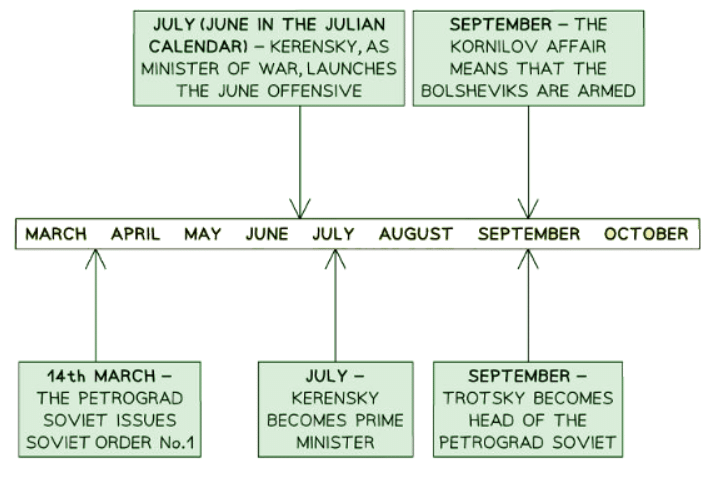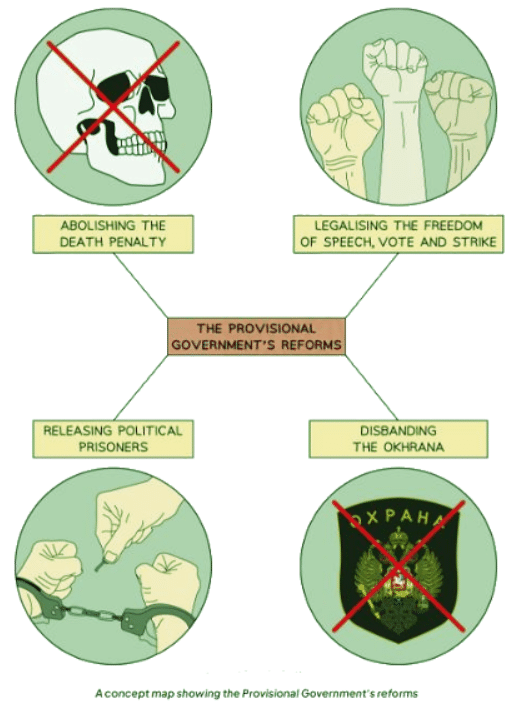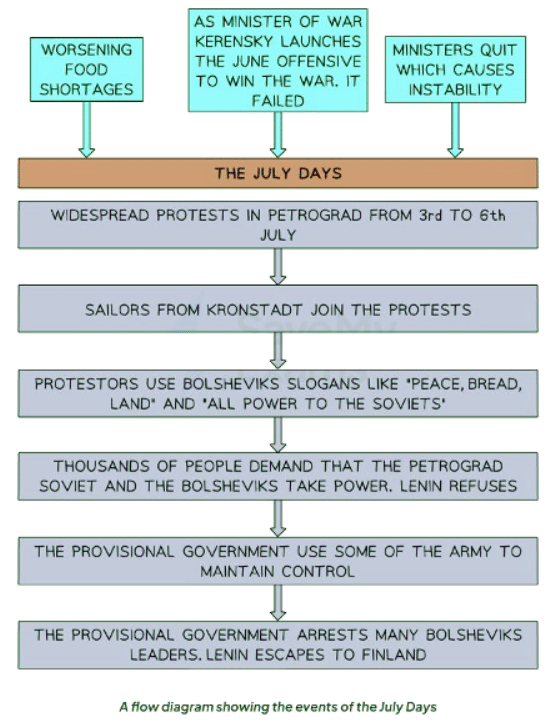Class 10 Exam > Class 10 Notes > History for GCSE/IGCSE > How Effective was the Provisional Government in 1917?
How Effective was the Provisional Government in 1917? | History for GCSE/IGCSE - Class 10 PDF Download
What was the Provisional Government? - Timeline & Summary

- After Tsar Nicholas abdicated in March 1917, Russia found itself in an unusual position. For 300 years, the Romanov dynasty had ruled Russia based on the Divine Right of Kings, resisting democratic reform. By March 1917, Russia was on the brink of establishing a democratic government.
- The Duma created the Provisional Government, consisting of 12 representatives. As the name suggests, it was a temporary solution to the power vacuum in Russia. Its goal was to establish political stability and discuss solutions to Russia's issues. The Russian people experienced unprecedented freedom. However, the Provisional Government became a failed experiment, proving too slow and facing too many challenges to be successful.
Issues with Dual Power
- The Provisional Government faced challenges in March 1917 when it had to form a Dual Power agreement with the Petrograd Soviet.
- The Petrograd Soviet's release of Soviet Order No. 1 instructed the Russian Army to prioritize the Petrograd Soviet over the Provisional Government, causing a rift in authority.
- Extremist parties, including the Bolsheviks, gained influence within the Petrograd Soviet, leading to further destabilization of the Provisional Government.
- The Petrograd Soviet's encouragement of worker strikes and its ability to sway the working class undermined the Provisional Government's authority.
- The power struggle between the Provisional Government and the Petrograd Soviet hindered effective governance, highlighting the challenges of dual authority.
Elections and Land
- The Provisional Government swiftly implemented changes:

- The Provisional Government avoided addressing larger issues. The Provisional Government:
- Recognized that the people had not elected them.
- Wanted elections to obtain a mandate but never set a date for these elections.
- Faced significant issues regarding land in Russia.
- Knew peasants wanted landowners to relinquish their land rights.
- Promised land redistribution.
- Delayed making a decision about land, preferring to wait for the election results.
- Dealt with peasants who refused to wait and began illegally seizing land by mid-1917.
The July Days

Were the July Days a Missed Opportunity for Lenin?
Historians often critique Lenin's choice not to support the July Days for various reasons:
- The Bolsheviks had substantial public backing.
- Lenin could have harnessed this support to instigate a 'revolution from below'.
- Within the Bolshevik Party, there was a belief that Lenin squandered his chance to lead Russia.
- Important Bolshevik figures like Trotsky were detained by the Provisional Government.
- Lenin had to escape to Finland, leaving the party without a leader.
Kornilov Affair
- In September, the Provisional Government faced significant challenges.
- Prince Lvov stepped down, and Kerensky took over as Prime Minister.
- Kerensky held the sole position in both the Provisional Government and the Petrograd Soviet.
- Russia was struggling in the First World War, marked by widespread strikes and food shortages.
- Historians offer varying perspectives on the events of September 1917, highlighting the following key points:
- The Provisional Government was in decline, with Prince Lvov's resignation leading to Kerensky assuming the role of Prime Minister. Kerensky held pivotal positions in both the Provisional Government and the Petrograd Soviet.
- The appointment of General Kornilov by Kerensky aimed to bolster control over the Russian Army amidst the challenging wartime conditions.
Question for How Effective was the Provisional Government in 1917?Try yourself: What was the goal of the Provisional Government in Russia in 1917?View Solution
Key Events of the Kornilov Affair
- By September, the Provisional Government was failing.
- Prince Lvov resigned, and Kerensky replaced him as Prime Minister.
- Kerensky was the only member of both the Provisional Government and the Petrograd Soviet.
- Russia was performing poorly in the First World War.
- Strikes and food shortages were widespread.
- To help maintain control, Kerensky appointed General Kornilov as commander of the Russian Army.
- Historians have different interpretations of what happened in September 1917:

- Kerensky panicked:
- He freed many key Bolsheviks.
- He armed the Red Guard so they could defend Petrograd from Kornilov.
- The Bolsheviks:
- Infiltrated Kornilov's troops and encouraged them to desert.
- Disrupted Kornilov's supplies by getting railway workers to strike.
- By the end of September:
- The Provisional Government had arrested Kornilov.
- Kerensky's power over Russia had weakened.
- The Red Guard were armed and did not return their weapons.
Continuation of the First World War
- The First World War was highly unpopular in Russia.
- The conflict resulted in millions of casualties and desertions.
- The war effort significantly affected food and fuel supplies in Russia.
- The Provisional Government persisted in Russia's engagement.
- The Provisional Government relied on investments from Britain and France.
- This issue led to a division in Dual Power.
- In March, the Petrograd Soviet announced its inability to support the war.
- The June Offensive intensified the resentment towards the war.
- Kerensky's attempts to repel Austrian troops were unsuccessful.
- Desertions soared as soldiers became more receptive to Bolshevik propaganda.
- This increased their allegiance to the Petrograd Soviet over the Provisional Government.
The document How Effective was the Provisional Government in 1917? | History for GCSE/IGCSE - Class 10 is a part of the Class 10 Course History for GCSE/IGCSE.
All you need of Class 10 at this link: Class 10
|
81 videos|88 docs|18 tests
|
FAQs on How Effective was the Provisional Government in 1917? - History for GCSE/IGCSE - Class 10
| 1. How was the Provisional Government formed in 1917? |  |
Ans. The Provisional Government was formed in Russia in 1917 following the abdication of Tsar Nicholas II during the February Revolution. It was composed of members of the State Duma, who aimed to establish a democratic government.
| 2. What challenges did the Provisional Government face due to Dual Power? |  |
Ans. The Provisional Government faced challenges due to the existence of Dual Power, where it shared power with the Petrograd Soviet. This led to conflicting decisions and a lack of clear authority, hindering effective governance.
| 3. How did the July Days impact the Provisional Government in 1917? |  |
Ans. The July Days were a period of unrest and protests in Petrograd in 1917, primarily led by Bolsheviks and soldiers. The government's inability to effectively handle the situation further weakened its authority and credibility.
| 4. What was the Kornilov Affair and how did it affect the Provisional Government? |  |
Ans. The Kornilov Affair was a failed coup attempt by General Kornilov against the Provisional Government in August 1917. Although the government managed to defeat the coup, it exposed its vulnerability and lack of support from the military.
| 5. How did the continuation of the First World War impact the effectiveness of the Provisional Government in 1917? |  |
Ans. The continuation of the First World War placed immense pressure on the Provisional Government, as it struggled to address the demands of the war-weary population while facing military setbacks. This further eroded its support and legitimacy.
Related Searches




















